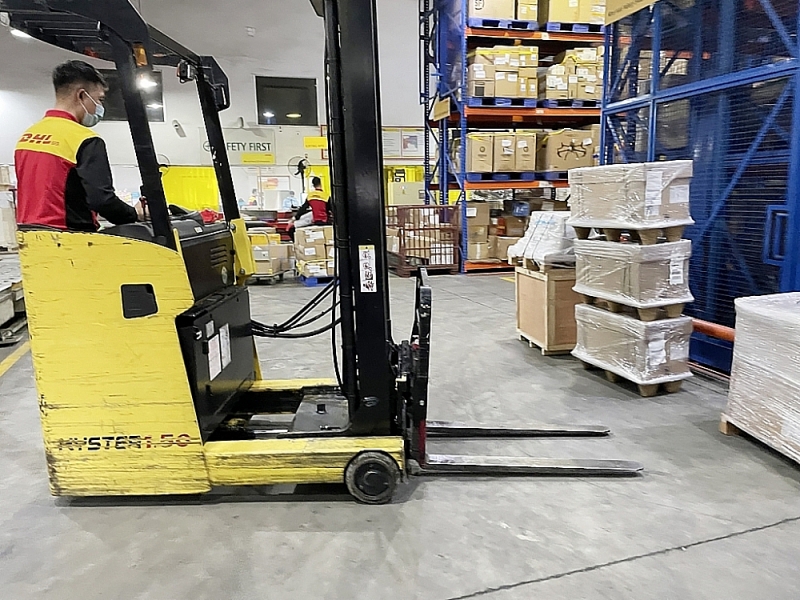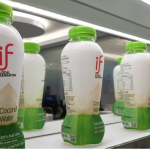Total number of posts 463.
 The Ministry of Finance (General Department of Customs) has developed and submitted to the Government a Decree on customs management for imports and exports transacted via e-commerce. While waiting for the issuance of the decree, businesses have raised many problems that need to be solved.
The Ministry of Finance (General Department of Customs) has developed and submitted to the Government a Decree on customs management for imports and exports transacted via e-commerce. While waiting for the issuance of the decree, businesses have raised many problems that need to be solved.
Remove problems
According to Hateco Logistics JSC, in the global trend of e-commerce development, the demand for logistics services of major e-commerce sites in the world and the region such as Lazada, Shopee, Tiki with goods sourced from China, which are imported into Vietnam or transited through Vietnam to other countries by air, is very high.
Meanwhile, the ability to meet the demand for goods transportation from China to other countries by air is restricted and transportation costs are high.
To find a new direction, Hateco Logistics notified that many customers buying and selling goods on e-commerce platforms expect to carry out procedures to receive goods through the northern border gates, international airports, seaports and railways to import goods into bonded warehouse at ICD Long Bien, and classify goods and stick air waybills of international courier companies and airlines (AirWaybill) and then transit the goods through Noi Bai international airport border gate to other countries.
According to Hateco Logistics JSC, such performance will facilitate the development of logistics services for e-commerce and promote the maximum exploitation of the capacity of ICD Long Bien.
Also related to the field of e-commerce, Than Toc Technology JSC said that the company has signed a contract to perform international express delivery services for e-commerce floors like Lazada and Shopee.
Accordingly, the goods transacted via these e-commerce floors will be transported by road, air and sea through border-gate customs branches (such as Huu Nghi Customs Branch, Mong Cai Customs Branch, Dinh Vu - Hai Phong Port Customs Branch, Noi Bai Airport Border Gate Customs Branch) to go through customs clearance procedures at the Express Customs Branch under Hanoi Customs Department.
However, the land border gates between Vietnam and China have been closed due to the Covid-19 pandemic.
In order to avoid the backlog of goods, e-commerce floors have sent goods by air to Ho Chi Minh City for customs clearance procedures performed by the Branch of Than Toc JSC at the Express Customs Branch under Ho Chi Minh City Customs Department.
The goods on e-commerce floors are usually decorative accessories with low value (less than VND1 million). To carry out the procedures, the company has classified goods, made customs declarations for group 2 and presented documents as prescribed. However, in Article 6 of Circular 56/2019 of the Ministry of Finance on customs documents for group 2, it is stipulated that enterprises present a document that is a “Bill of lading or other transport documents of equivalent value for goods transported by sea, air, railway, multimodal transport as prescribed by law (for imported goods): 1 photocopy.”
Currently, the e-commerce platforms Lazada and Shoppee have set up an information technology system to manage order, delivery, inventory and connect with systems in the exporting country, make customs declarations with exporting country and provide data to buyers, consignors and carriers for transport documentation. As the provisions in Article 6 of Circular 56/2019 do not refer to specific criteria, it is difficult to make the declaration.
Therefore, the company recommends that e-commerce floors provide data through the system for buyers, consignors and carriers to use as transport documents, can these documents be considered as other transport documents of equivalent value.
If they are considered an equivalent transport document, how will the consignor update it on the national single window system. Because the number of transport documents by road, air, and sea may be up to 100,000 - 200,000 data lines.
Currently, problems related to e-commerce activities are being researched and guided by the General Department of Customs. Specific guidance will remove obstacles as well as ensure goods of e-commerce floors will not be interrupted while waiting for the issuance of a decree on customs management for imports and exports transacted via e-commerce.
Policies to promote development
For customs management for import and export activities transacted via e-commerce sites, the Ministry of Finance has submitted the decree to the Government with new orientations to meet the state management of imports and exports transacted via e-commerce and reduce shortcomings, thereby reducing customs clearance time, saving costs and help buyers on e-commerce floors buying goods from many countries in the world with a good value, price and fast delivery thanks to simplification and transparency in the implementation of customs procedures.
The draft Decree stipulates key issues including the scope governed by the decree on trading floors, e-commerce websites, carriers of goods transacted via e-commerce; specific regulations on tax incentives and commodity policies for imported goods transacted via e-commerce, specifically, exemption from import tax, license and specialized inspection for imported orders with a certain value of goods.
In addition, the draft Decree provides information security for goods in e-commerce transactions to serve management during the transport process from ordering to exporting.
Source: Customs News














